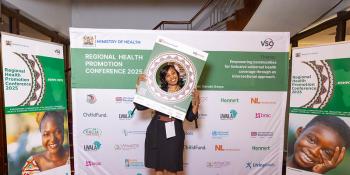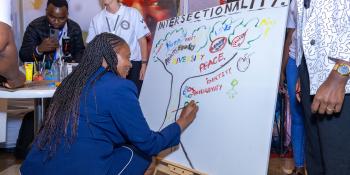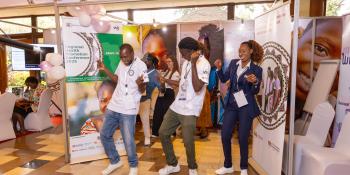A billion people in the world are volunteers. A new UN report rightly recognises their vital role combatting the growing global threat of natural and man-made disasters, writes VSO’s Chief Executive Philip Goodwin.
This week, United Nations Volunteers released its State of the World’s Volunteerism Report. It shines a much-needed light on the vital role of volunteers in building resilience.
The report, launched as countries gather at the UN to present their progress towards the Sustainable Development Goals (SDGs), investigates why this incredible network of volunteers is so powerful at creating change.
Volunteers as first responders
At VSO, we’ve seen time and again that when a crisis hits, volunteers are first on the scene. In Sierra Leone’s capital Freetown, volunteers provided clean water, soap and hygiene information to people whose homes were destroyed by a deadly mudslide and flooding in August 2017. The same year, VSO volunteers in Nepal leaped into action in response to floods. They coordinated the initial delivery of aid, supported health camps for senior citizens and promoted hygiene in schools.
Volunteers are well placed to respond to crises, but prevention is better than cure. VSO volunteers help communities become resilient against the threat of potential shocks and stresses.
Planning ahead
In the cases of Sierra Leone and Nepal, community volunteers are preparing communities for future catastrophes by mapping out potential hazards, and educating people about early warning signs that another disaster is about to strike.
In Pakistan, volunteers have trained community members from one minority group, the Hazaras, a group that is often the target of violent attacks, to provide emergency first aid to those injured in violent attacks, as well as giving them the tools to minimise the impact of violent attacks and natural disasters. Youth volunteers in Pakistan are working to keep the peace through a series of plays, radio announcements and social media posts to encourage interfaith harmony.
Among the proven ways volunteering leads to sustainable and transformational change is its effectiveness at reaching the most marginalised. These most vulnerable people often suffer the most after shocks and disasters, and the UN report also flags volunteers’ important role to play here (building on the finding of our Valuing Volunteering research with the Institute of Development Studies).
Setting a global standard for volunteering
But this report also offers some important warnings.
We shouldn’t romanticise the role that volunteers play in responding to crisis. As I know from visiting and listening to some of our thousands of volunteers around VSO’s programmes, volunteers face considerable challenges, often working with limited resources.
We also need to make the distinction between government services and the role of volunteering: volunteering should complement, not replace, government services.
That is why VSO is working with 25 organisations from the volunteering and development sectors to develop a set of agreed global standards for volunteering. This will ensure that every one of our volunteers has the most impact possible, and that organisations are working with volunteers in a responsible way.
Volunteers matter. They play a critical and often under-valued role in delivering the SDGs, which deserves to be recognised by governments around the world. You can read the full report from the UN here.
Read more

In photos: Our Regional Health Promotion Conference 2025
Check out some of our favourite photos from Regional Health Promotion Conference (RHPC25). This event sought to reimagine Universal Health Coverage through the lens of intersectionality.

Using intersectionality to create healthy beginnings and hopeful futures
World Health Day brings global attention to the urgent need to end preventable maternal and newborn deaths. Learn more about how our Regional Health Promotion Conference is tackling these issues head on.

Highlights from the Regional Health Promotion Conference 2025
The Regional Health Promotion Conference 2025 reimagined Universal Health Coverage (UHC) through the lens of intersectionality, by bringing together experts from across East Africa and beyond.
